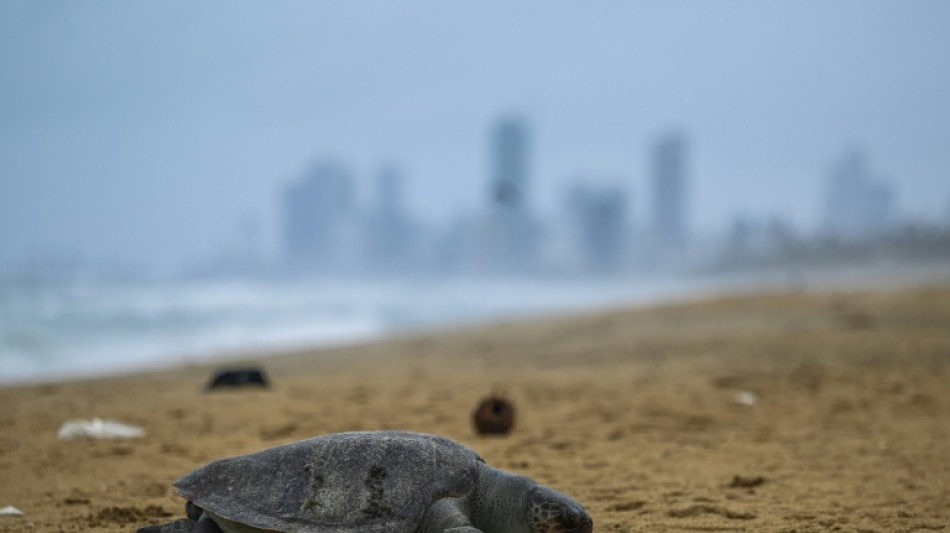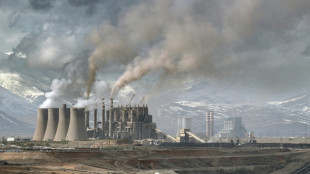
-
 Williams 'on the back foot' after missing Barcelona: Albon
Williams 'on the back foot' after missing Barcelona: Albon
-
Real Madrid submit evidence to UEFA in Vinicius racism probe

-
 Olympics rev up Milan's renewal but locals fear price to pay
Olympics rev up Milan's renewal but locals fear price to pay
-
Cardona Coll, Fatton win Olympic-debuting ski mountaineering sprint golds

-
 MSF will keep operating in Gaza 'as long as we can': mission head
MSF will keep operating in Gaza 'as long as we can': mission head
-
Russian Filippov wins first medal at Milan-Cortina Games for individual neutral athletes

-
 Italian Milan takes sprint honours at UAE Tour
Italian Milan takes sprint honours at UAE Tour
-
Dozens killed in jihadist attacks in northwest Nigeria

-
 Zimbabwe unbeaten in T20 World Cup after six-wicket Sri Lanka win
Zimbabwe unbeaten in T20 World Cup after six-wicket Sri Lanka win
-
Postecoglou admits taking Nottingham Forest post a 'bad decision'

-
 Switzerland's Fatton wins women's ski mountaineering sprint on Olympic debut
Switzerland's Fatton wins women's ski mountaineering sprint on Olympic debut
-
Kinghorn, Van der Merwe return for Scotland against Six Nations strugglers Wales

-
 Repsol says could boost Venezuela oil output over 50% in 12 months
Repsol says could boost Venezuela oil output over 50% in 12 months
-
UN says Israeli actions raise 'ethnic cleansing' fears in West Bank, Gaza

-
 Arteta tells faltering leaders Arsenal to harness Wolves 'pain' against Spurs
Arteta tells faltering leaders Arsenal to harness Wolves 'pain' against Spurs
-
Crowley gets nod for Irish as Prendergast drops out

-
 Unbeaten Swiss to meet Great Britain in Olympic men's curling semis
Unbeaten Swiss to meet Great Britain in Olympic men's curling semis
-
UK police arrest ex-prince Andrew on suspicion of misconduct

-
 Oil extends gains on US-Iran tensions, Europe stocks slide
Oil extends gains on US-Iran tensions, Europe stocks slide
-
Former prince Andrew, a historic downfall

-
 Sri Lanka post 178-7 against Zimbabwe ahead of T20 Super Eights
Sri Lanka post 178-7 against Zimbabwe ahead of T20 Super Eights
-
OpenAI's Altman tells leaders regulation 'urgently' needed

-
 US renews threat to leave IEA
US renews threat to leave IEA
-
Liverpool boss Slot says Isak in 'final stages of rehab'

-
 Airbus ready to build two new European fighter jets if 'customers' ask
Airbus ready to build two new European fighter jets if 'customers' ask
-
UN Sudan probe finds 'hallmarks of genocide' in El-Fasher

-
 Costelow starts, Hamer-Webb makes Wales debut in Six Nations clash with Scotland
Costelow starts, Hamer-Webb makes Wales debut in Six Nations clash with Scotland
-
Facing US warnings, Iran defends right to nuclear enrichment

-
 Ex-South Korea leader Yoon gets life in prison for insurrection
Ex-South Korea leader Yoon gets life in prison for insurrection
-
OpenAI's Altman says at India summit regulation 'urgently' needed

-
 British couple held in Iran sentenced to 10 years
British couple held in Iran sentenced to 10 years
-
West Indies ease past Italy to tune up for T20 Super Eights

-
 At least 16 killed after building collapses in Pakistan following blast
At least 16 killed after building collapses in Pakistan following blast
-
Summit photo op fails to unite AI startup rivals

-
 OpenAI's Altman says world 'urgently' needs AI regulation
OpenAI's Altman says world 'urgently' needs AI regulation
-
Horror comics boom in our age of anxiety

-
 Turkey fires up coal pollution even as it hosts COP31
Turkey fires up coal pollution even as it hosts COP31
-
London fashion week opens with tribute to one of its greats

-
 Ex-S.Korea leader Yoon gets life in prison for insurrection
Ex-S.Korea leader Yoon gets life in prison for insurrection
-
Pea soup, veggie mash contest warms up Dutch winter

-
 South Korea's Yoon: from rising star to jailed ex-president
South Korea's Yoon: from rising star to jailed ex-president
-
Private companies seek to import fuel amid Cuban energy crisis

-
 India search for 'perfect game' as South Africa loom in Super Eights
India search for 'perfect game' as South Africa loom in Super Eights
-
India's Modi calls for inclusive tech at AI summit

-
 Airbus planning record commercial aircraft deliveries in 2026
Airbus planning record commercial aircraft deliveries in 2026
-
Elections under fire: Colombia endures deadliest campaign in decades

-
 Traore backs 'hungry' Italy against France in Six Nations
Traore backs 'hungry' Italy against France in Six Nations
-
All-rounder Curran brings stuttering England to life at the death

-
 South Korea court weighs death sentence for ex-president Yoon
South Korea court weighs death sentence for ex-president Yoon
-
Tech chiefs address India AI summit as Gates cancels


Over 21% of reptile species at risk of extinction
At least one in five reptile species are threatened with extinction, including more than half of turtles and crocodiles, according to the first major global assessment of the world's so-called cold-blooded creatures.
Catastrophic declines in biodiversity across the world are increasingly seen as a threat to life on Earth -- and as important as the interrelated menace of climate change.
Threats to other creatures have been well documented. More than 40 percent of amphibians, 25 percent of mammals and 13 percent of birds could face extinction.
But until now, researchers did not have a comprehensive picture of the proportion of reptiles at risk.
In a new global assessment, published in the journal Nature, researchers assessed 10,196 reptile species and evaluated them using criteria from the International Union for Conservation of Nature (IUCN) Red List of threatened species.
They found that at least 1,829 -- 21 percent -- were either vulnerable, endangered or critically endangered.
"It's just overwhelming the number of species that we see as being threatened," said co-author Neil Cox, who manages of the IUCN-Conservation International Biodiversity Assessment Unit and co-led the study.
"Now we know the threats facing each reptile species, the global community can take the next step by joining conservation plans with global policy agreement and invest in turning around the often too under-appreciated and severe biodiversity crisis."
Crocodiles and turtles were found to be among the most at-risk species, with around 58 percent and 50 percent found to be under threat respectively.
Cox said this was often down to "over-exploitation and persecution".
Crocodiles are killed for their meat and to remove them from human settlements, he said, while turtles are targeted by the pet trade and used for traditional medicine.
- 'Furry, feathery' focus -
Another well-known species at risk is the fearsome king cobra, the world's largest venomous snake. It can grow to around five metres long, feasting on other snakes in forests across a huge area from India to Southeast Asia.
It has been classified as vulnerable, indicating it is "very close to extinction", Cox said at a press briefing on the research.
"It's a real iconic species in Asia and it's such a shame that even widespread species such as this are really suffering and in decline," he said, adding that logging and deliberate attacks by humans were among the biggest threats to the snake.
Bruce Young, chief Zoologist at NatureServe, who co-led the study, said threatened reptiles were largely found concentrated in Southeast Asia, Western Africa, northern Madagascar, the Northern Andes and the Caribbean.
The researchers found reptiles restricted to arid habitats such as deserts, grasslands, and savannas "are significantly less threatened" than those in forest habitats, he explained.
Agriculture, logging, invasive species and urban development were found to be among the threats to reptiles, while people also target them for the pet trade or kill them for food or out of fear.
Climate change was found to pose a direct threat to some 10 percent of reptile species, although researchers said that was likely an underestimate.
The researchers were surprised to find that conservation aimed at other creatures had also benefited reptiles to an extent, although they stressed that the study highlights the need for specific urgent conservation for some reptiles.
Young said the reptile assessment, which involved hundreds of scientists from across the world, took around 15 years to complete and was hampered by a lack of funding.
"Reptiles, to many people, are not charismatic. And there's just been a lot more focus on some of the more furry or feathery species of vertebrates for conservation," he said.
Researchers said they hope the new assessment will help spur international action to halt biodiversity loss.
G.Stevens--AMWN



